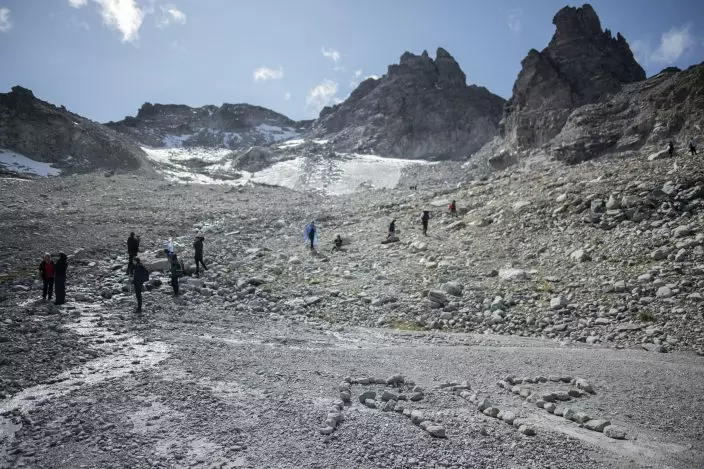Saying humanity is waging war with the planet, the head of the United Nations isn't planning to let just any world leader speak about climate change at Monday's special "action summit."
Only those with new, specific and bold plans can command the podium and the ever-warming world's attention, Secretary-General Antonio Guterres said.
So sit down Brazil. Sit down Saudi Arabia. Sit down Poland

The letters 'RIP' (rest in peace) are written with stones during a commemoration in front of the 'dying' glacier of Pizol mountain in Wangs, Switzerland, Sunday, Sept. 22, 2019. Various organizations gathered to shine a light on climate change and melting glaciers. (Gian EhrenzellerKeystone via AP)
"People can only speak if they come with positive steps. That is kind of a ticket," Guterres said. "For bad news don't come."
As if to underscore the seriousness of the problem, the U.N.'s World Meteorological Organization released a quick science report Sunday showing that in the last several years, warming, sea level rise and carbon pollution have all accelerated.
Brazil's, Poland's and Saudi Arabia's proposals for dealing with climate change fell short, so they're not on Monday's summit schedule. The United States didn't even bother, according to a U.N. official, who spoke on condition of anonymity.
The bar isn't that high: Leaders from 64 nations, the European Union, more than a dozen companies and banks, a few cities and a state will present plans at the secretary-general's Climate Action Summit.
Guterres wants nations to be carbon-neutral by 2050 — in other words, they will not add more heat-trapping greenhouse gases into the air than are removed by plants and perhaps technology each year. On Sunday, 87 countries around the world pledged to decarbonize in a way consistent with one of the international community's tightest temperature goals.
There is a sense of urgency, Guterres said, because "climate change is the defining issue of our time."
"For the first time, there is a serious conflict between people and nature, between people and the planet," Guterres said.
He wants countries to commit to no new coal power plants after 2020 and reduce carbon pollution by 45% in the next century. The purpose of the summit is to come up with new green proposals a year earlier than the 2020 deadline that is in the 2015 Paris climate agreement.
World leaders agreed in 2009 to try to keep warming to just 2 degrees Celsius (3.6 degrees Fahrenheit) since pre-industrial times. Then in 2015 they added a secondary, tougher goal, at the urging of small islands, to keep warming to just 1.5 degrees Celsius (2.7 degrees Fahrenheit).
The new weather agency report showed that the world has warmed already by 1.1 degrees Celsius (2 degrees Fahrenheit). So that means the goals are to limit further warming to 0.9 degrees Celsius (1.6 degrees Fahrenheit) from now or even 0.4 degrees Celsius (0.72 degrees Fahrenheit) from now.
Efforts to reduce carbon pollution need to be tripled to keep from hitting the 2-degree Celsius mark and must increase fivefold to limit warming to 1.5 degrees Celsius since pre-industrial times, the World Meteorological Organization report said.
As bad as that sounds, it's wrong and overly optimistic to use the mid-1880s as the benchmark, said Pennsylvania State University climate scientist Michael Mann. Mann said that many studies, including the WMO's, are overlooking that the world has warmed 0.2 degrees Celsius (0.36 degrees Fahrenheit) from human causes since the mid-1700s.
The weather agency said the last five years were the warmest five on record and even 0.2 degrees Celsius (0.36 degrees Fahrenheit) hotter than the first half of the decade, a significant jump in just a few years.
"There is a growing recognition that climate impacts are hitting harder and sooner than climate assessments indicated even a decade ago," the 28-page report said.
A larger, more international report looking at climate change and oceans and ice will be released by the Intergovernmental Panel on Climate Change on Wednesday.
"This new WMO report highlights the importance of making more progress on reducing emissions of carbon dioxide," Cornell University climate scientist Natalie Mahowald said. "Hopefully this latest U.N. Climate Summit will motivate more action."
UNITED NATIONS (AP) — The world hasn’t seen anything like the unprecedented destruction of housing in Gaza since World War II, and it would take at least until 2040 to restore the homes devastated in Israel’s bombing and ground offensive if the conflict ended today, the United Nations reported Thursday.
The U.N. assessment said the social and economic impact of the war launched after Hamas’ surprise attack in southern Israel on Oct. 7 has been increasing “in an exponential manner.”
It called the level of casualties – 5% of Gaza’s 2.3 million population -- “unprecedented” in such a short time. By mid-April, it said, over 33,000 Palestinians had been killed and more than 80,000 injured. About 7,000 others remain missing, most believed to be buried under the rubble.
“Every additional day that this war continues is exacting huge and compounding costs to Gazans and all Palestinians” said United Nations Development Program Administrator Achim Steiner.
The report by UNDP and the U.N. Economic Commission for Western Asia paints a dire picture of the struggle to survive in Gaza where 201,000 jobs have been lost since the war began and the economy contracted 81% in the last quarter of 2023.
Abdallah Al Dardari, UNDP’s regional director for Arab states, told a U.N. press conference launching the report that almost $50 billion in investments in Gaza are estimated to have been wiped out in the conflict, and 1.8 million Palestinians have fallen into poverty.
Gaza has been under blockade by Israel and Egypt since Hamas’ 2007 takeover, putting tight controls on what enters and exits the territory. Even before the war, it faced “hyper-unemployment” of 45%, reaching nearly 63% among younger workers.
According to the report, the U.N. Human Development Index – which measures key issues for a long and healthy life, for gaining knowledge and for achieving a decent standard of living – has been pushed back more than 20 years in Gaza.
The “productive basis of the economy has been destroyed,” the report said, with sectors experiencing losses of more than 90%. It estimated that the GDP of Gaza could decrease by 51% in 2024.
“The scope and scale of damages have been unprecedented and still mounting as the war still rages on,” it said.
At least 370,000 housing units in Gaza have been damaged, including 79,000 destroyed completely, the report said, along with commercial buildings.
After previous Israel-Hamas conflicts, housing was rebuilt at a rate of 992 units a year, it said. Even if Israel allows a five-fold increase of construction material to enter Gaza, it would take until 2040 to rebuild the destroyed houses, without repairing the damaged ones.
Al Dardari said that after 51 days of fighting between Israel and Hamas in 2014 there were 2.4 million tons of debris in Gaza. In the current war, he said, there are already 37 tons of debris that need to be removed to make space for temporary shelters and other structures which are critical to return some sort of normalcy to Palestinians in Gaza.
“We haven't seen anything like this since 1945, since the Second World War — that intensity in such a short time, and the massive scale of destruction,” he said.
Al Dardari said the preliminary estimate of the cost of an early recovery program for three years, which would bring hundreds of thousands of Palestinians back to temporary shelters in their original locations with community support, is between $2 billion and $3 billion.
The rough estimate for the overall reconstruction of Gaza is between $40 billion and $50 billion, he said.
But Al Dardari stressed that the immediate focus now is on planning for early recovery.
He said the U.N. senior humanitarian and reconstruction coordinator for Gaza, Sigrid Kaag, and other officials met earlier Thursday with 22 U.N. agencies and went through plans by each one for the initial years after the war ends.
“We are on the verge of developing and finalizing a unified view and early recovery framework that is Palestinian-centered, Palestinian-led and owned by the Palestinian people,” Al Dardari said.
Associated Press Writer Lee Keath contributed to this report from Cairo

The unprecedented destruction of housing in Gaza hasn't been seen since World War II, the UN says

The unprecedented destruction of housing in Gaza hasn't been seen since World War II, the UN says

Palestinians look at the destruction after an Israeli airstrike in Deir al Balah, Gaza Strip, Tuesday, April 30, 2024. (AP Photo/Abdel Kareem Hana)













